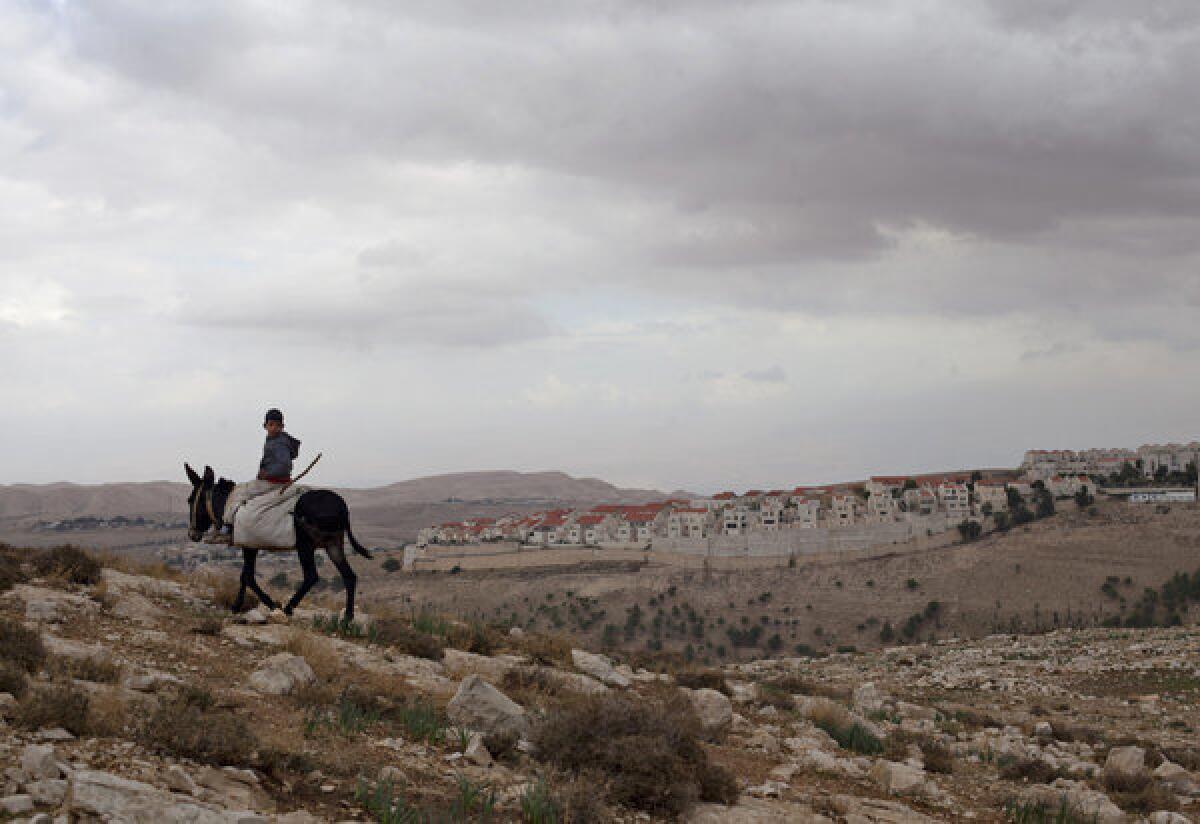Israel moves forward with controversial West Bank development

- Share via
JERUSALEM – Israel took another step Wednesday toward developing a highly sensitive plot of West Bank land, submitting construction plans for nearly 3,400 units of new Jewish housing on the outskirts of Jerusalem.
The project, known as E-1, has drawn fierce criticism from the United States, United Nations and European nations which fear it might severely cripple efforts to create a viable, contiguous Palestinian state.
E-1, which sits on more than four square miles of rolling hills near the West Bank settlement of Maale Adumim, would partially divide the northern and southern areas of the West Bank and isolate the Arab neighborhoods of East Jerusalem, where Palestinians hope to put the capital of their state.
The development plans were submitted Wednesday by the Civil Administration, a unit of the Israel Defense Forces that oversees construction in the occupied territories.
The public has two months to voice objections before final approval could be granted. If the project is approved, it is estimated that construction could begin within a year.
Israel said last week that it would revive the controversial project in response to the U.N. General Assembly vote to upgrade the status of Palestinian territories from “entity” to “nonmember observer state.”
For nearly two decades, Israeli governments had agreed with U.S. requests to freeze development of E-1.
In one of its harshest condemnations of an Israeli settlement in years, the U.S. State Department said Monday that the E-1 project was “especially damaging” to the peace process.
Most of the world considers Israel’s construction of Jewish housing on land it occupied during the 1967 Middle East war as illegal under international law.
Israeli Prime Minister Benjamin Netanyahu defended what he said was the country’s right to build in East Jerusalem and the West Bank, and blamed Palestinians for circumventing peace talks by turning to the U.N. in its pursuit of statehood.
“On E-1, there has been no decision to build, only to allow for statutory planning,’’ said government spokesman Mark Regev. He said the planning process of E-1, which has been ongoing for years, does not violate Israel’s commitments to the U.S. against building in the area.
The project has triggered a diplomatic clash between Israel and several European governments, which are threatening to take retaliatory measures against Israel if it does not reverse its decision.
The announcement came as Netanyahu arrived in Berlin for what is likely to be a tense meeting with German Chancellor Angela Merkel. Merkel opposes the E-1 development and has voiced frustration with Israel’s continued settlement construction.
Netanyahu told the German newspaper Die Welt on Wednesday that he was “disappointed” that Germany did not vote against the Palestinian bid at the U.N., choosing to abstain instead.
Palestinian officials have said the E-1 development could be grounds to file a complaint against Israel in the International Criminal Court, which they hope to join following their upgrade in status at the U.N.
Palestinian Authority President Mahmoud Abbas said Wednesday that he would ask the U.N. Security Council to call for a freeze of all Israeli settlement activity.
“The settlement project Israel has announced in E-1 is a red line,” he said.
Some viewed Netanyahu’s move to revive E-1 as a way to punish both Palestinians, for submitting the U.N. resolution, and the international community, for supporting the bid. Though the U.S. and Czech Republic voted against the resolution, European nations either abstained or voted with Palestinians.
Critics also noted that Netanyahu is seeking reelection next month and may be using E-1 to appeal to settlers and right-wing voters.
“This is a kind spontaneous reaction by Israel but my bet is that it will evaporate because of the international pressure,’’ said former peace negotiator Yossi Beilin, now a consultant in Herziliya. “I hope it’s more of a threat than a reality.
“E-1 is not just another settlement,” Beilin added. “But this is a right-wing government that believes in settlements and whenever there is an opportunity, they’ll take it.”
ALSO:
Israel’s deputy foreign minister dropped from election slate
Egyptian police fire tear gas during rally against President Morsi
Shelling reportedly hits school in Damascus, killing at least nine
More to Read
Sign up for Essential California
The most important California stories and recommendations in your inbox every morning.
You may occasionally receive promotional content from the Los Angeles Times.









